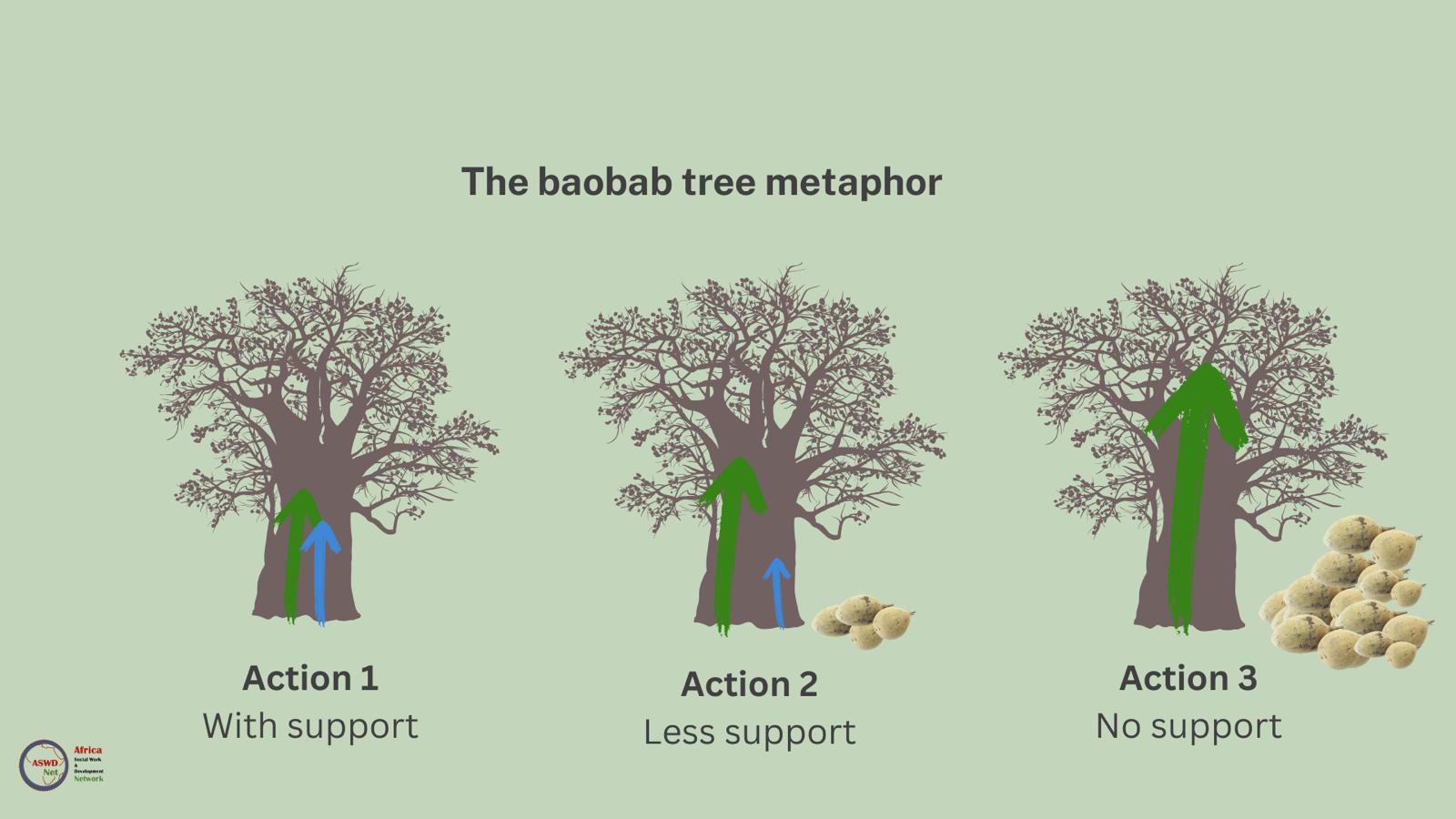
The baobab tree metaphor of action research
Action research tests potential solutions to social and development problems to find the most effective ones. It is simply a social or development experiment. The types of action research are:
- Participatory Action Research
- Non-participatory Action Research
- Quasi-participatory Action research
The specific methods of action research are:
- Family Action Research (FAR) – at the family level
- Community Action Research (CAR) – at the community level
- Social Action Research (SAR) – at the societal level
- Development Action Research (DAR) – focused on development
The baobab tree metaphor of participatory action
One upon a time, a community needed baobab fruits from a tall tree but did not have the skills to climb up and get it. Another community had techniques to climb trees to get food but were not experienced with baobab tree that are thick and tall. The two communities built a relation, then agreed to research together the best methods of climbing, through trial and error.
The first time they climbed together, working closely but they did not get far, and did not get any fruit. The visiting community did not lead, but supported behind. After this attempt, lessons were drawn and methods were improved together.

They tried the second time, this time the visiting community was far and behind. More lessons, skills and motivation came out of this second attempt.

The third time, the visiting community was very far, almost invisible, but the harvest was enough.

This is how participatory action research works.
The steps of action research
So, the steps of action research
- Form relationships with families, communities etc
- Together, talk about the nature of the problem and share potential solutions
- Identify the problems that current solutions are unable to solve
- Agree on a solution to test first and test it, review and improve
- Test other agreed solutions subsequently, at each stage the ‘outsider’ withdraws
- Adopt the working solution
- Document and report, if necessary, through oral storage, report, journal article, policy submissions etc
Omodan and Nontyatyambo’s 2023 Model of Participatory Action Research
Cite as: Omodan, B I and Nontyatyambo P D (2023). “Analysis of Participatory Action Research as a Decolonial Research Methodology” Social Sciences 12, no. 9: 507. https://doi.org/10.3390/socsci12090507
Their model has 3 elements or assumptions: inclusivity in the research process, recognition of the researched, and acting for transformative change.
| Elements | Details |
| Inclusive research process | “PAR involves a collaborative process that brings together those facing the problem and creates a platform for them to collectively discover solutions. This research method has been seen as an empowering approach to reducing the gap between researchers, decision-makers, and those affected by the issue. As such, it encourages inclusivity and provides a space for groups to discuss their issues and advocate for change. Furthermore, this model prioritises knowledge accumulated from the direct experience of the people being studied, challenging traditional forms of research, which often favour scientist-driven methods with smaller numbers of participants. Consequently, PAR stands in the position to sustainably create environments that benefit both the researcher and the researched.” |
| Recognition of the researched | “PAR acknowledges and privileges each party’s unique contributions to the research process. From PAR, a non-hierarchical structure is established where power is shared mutually between the participant and researcher. Both parties are equal contributors in the co-creation of knowledge within the research project. In doing so, PAR presents an opportunity for stakeholders to use their knowledge in a meaningful way to benefit all parties involved, from practitioners influencing policy to participants seeing direct impacts from sharing their experiences. Ultimately, PAR fosters meaningful dialogue between the subject of research and the researcher, increasing understanding from both sides and ultimately expanding collective wisdom.” |
| Actionable change | “PAR is a research methodology rooted in the belief that evidence-based action taken on behalf of marginalised communities is essential in fostering meaningful civic engagement and ultimately promoting social change. It encourages researchers to involve community members as active participants during all stages of the research process, including identifying research needs, designing data collection methods, collecting data, and generating strategies for taking action. By giving those typically excluded from decision-making processes ownership over their own research agenda, PAR democratises knowledge production while providing avenues for empowering communities to take concerted action towards achieving their vision of self-improvement. As such, PAR can be seen as a tool for collective activism and transformative social justice that has far-reaching implications for lasting change.” |
Decolonising the research process is inevitable in today’s world full of social and power inequalities. Participatory Action Research (PAR), as one of the methodologies that enhances the transformation of both the researchers and researched, is, therefore, inevitable in social research targeting social, inclusive, and informed change. …The elements, therefore, resonate with the decolonial agenda to deconstruct oppressive power structures and remembering those who have been historically dismembered by systems of colonial occupation.
Omodan, Bunmi Isaiah, and Nontyatyambo Pearl Dastile (2023)
Use the form below to subscibe to Owia Bulletin.
Discover more from Africa Social Work & Development Network | Mtandao waKazi zaJamii naMaendeleo waAfrika
Subscribe to get the latest posts sent to your email.




You must be logged in to post a comment.